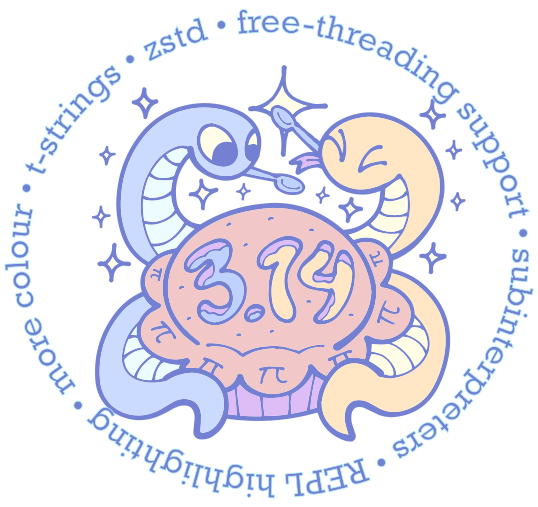Not one but two expedited releases! 🎉 🎉
Python 3.14.0rc2
It’s the
final 🪄 penultimate 🪄 3.14 release candidate!
https://www.python.org/downloads/release/python-3140rc2/
Note: rc2 was originally planned for 2025-08-26, but we fixed
a bug that required bumping the magic number stored in Python
bytecode (.pyc) files. This means .pyc
files created for rc1 cannot be used for rc2, and they’ll be
recompiled.
The ABI isn’t changing. Wheels built for rc1 should be fine for rc2,
rc3 and 3.14.x. So this shouldn’t affect too many people but let’s get
this out for testing sooner.
Due to this early release, we’ll also add a third release candidate
between now and the final 3.14.0 release, with no planned change to the
final release date.
This release, 3.14.0rc2, is the penultimate release
preview. Entering the release candidate phase, only reviewed code
changes which are clear bug fixes are allowed between this release
candidate and the final release.
The next pre-release of Python 3.14 will be the final release
candidate, 3.14.0rc3, scheduled for 2025-09-16; the official release of
3.14.0 is scheduled for Tuesday, 2025-10-07.
There will be no ABI changes from this
point forward in the 3.14 series, and the goal is that there will be as
few code changes as possible.
Call to action
We strongly encourage maintainers of
third-party Python projects to prepare their projects for 3.14 during
this phase, and publish Python 3.14 wheels on PyPI to be ready for the
final release of 3.14.0, and to help other projects do their own
testing. Any binary wheels built against Python 3.14.0 release
candidates will work with future versions of
Python 3.14. As always, report any issues to the Python bug
tracker.
Please keep in mind that this is a preview release and while it’s as
close to the final release as we can get it, its use is
not recommended for production
environments.
Core
developers: time to work on documentation now
- Are all your changes properly documented?
- Are they mentioned in What’s
New?
- Did you notice other changes you know of to have insufficient
documentation?
Major
new features of the 3.14 series, compared to 3.13
Some of the major new features and changes in Python 3.14 are:
New features
(Hey, fellow core developer, if a feature you
find important is missing from this list, let Hugo know.)
For more details on the changes to Python 3.14, see What’s new in
Python 3.14.
Build changes
Note that Android binaries are new in rc2!
- PEP
761: Python 3.14 and onwards no longer provides PGP signatures for
release artifacts. Instead, Sigstore is recommended for verifiers.
- Official macOS and Windows release binaries include an experimentalJIT
compiler.
- Official Android binary
releases are now available.
Incompatible
changes, removals and new deprecations
Python install manager
The installer we offer for Windows is being replaced by our new
install manager, which can be installed from the Windows
Store or from its download
page. See our
documentation for more information. The JSON file available for
download below contains the list of all the installable packages
available as part of this release, including file URLs and hashes, but
is not required to install the latest release. The traditional installer
will remain available throughout the 3.14 and 3.15 releases.
Python 3.13.7
This is
the seventh maintenance release of Python 3.13
https://www.python.org/downloads/release/python-3137/
Python 3.13 is the newest major release of the Python programming
language, and it contains many new features and optimizations compared
to Python 3.12. 3.13.7 is the seventh maintenance release of 3.13.
3.13.7 is an expedited release to fix a significant issue with the
3.13.6 release:
- gh-137583:
Regression in ssl module between 3.13.5 and 3.13.6: reading from a
TLS-encrypted connection blocks
A few other bug fixes (which would otherwise have waited until the
next release) are also included.
More resources
And now for
something completely different
The magpie, Pica pica in Latin, is a black and white bird in
the crow family, known for its chattering call.
The first-known use in English is from a 1589
poem, where magpie is spelled “magpy” and cuckoo is “cookow”:
Th[e]y fly to wood like breeding hauke,
And leave old neighbours loue,
They pearch themselves in syluane lodge,
And soare in th' aire aboue.
There : magpy teacheth them to chat,
And cookow soone doth hit them pat.
The name comes from Mag, short for Margery or Margaret (compare robin
redbreast, jenny wren, and its corvid relative jackdaw); and pie, a
magpie or other bird with black and white (or pied) plumage. The sea-pie
(1552) is the oystercatcher, the grey pie (1678) and murdering pie
(1688) is the great grey shrike. Others birds include the yellow and
black pie, red-billed pie, wandering tree-pie, and river pie. The
rain-pie, wood-pie and French pie are woodpeckers.
Pie on its own dates to before 1225, and comes from the Latin name
for the bird, pica.
Enjoy the new releases
Thanks to all of the many volunteers who help make Python Development
and these releases possible! Please consider supporting our efforts by
volunteering yourself or through organisation contributions to the Python Software
Foundation.
Regards from a busy Helsinki on Night of the
Arts,
Your release team,
Hugo van Kemenade
Thomas Wouters
Ned Deily
Steve Dower
Łukasz Langa

